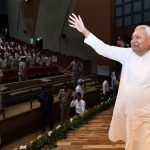The Death of Gossip
When the networker is in isolation
 Kaveree Bamzai
Kaveree Bamzai
 Kaveree Bamzai
Kaveree Bamzai
 |
24 Apr, 2020
|
24 Apr, 2020
/wp-content/uploads/2020/04/Deathofgossip.jpg)
(Illustration: Saurabh Singh)
Assignations. Resignations. Defections. Derelictions.
What is gossip for some, and rumour to many, is the fuel that enables the smooth functioning of the long power corridor that stretches from Mumbai’s corporate world to Delhi’s political universe. Those who know how to negotiate this Mumbai-Delhi beltway strike gold, even if momentarily. Those who can’t soon find themselves ground into pixie dust, in a suitable cell in Tihar Jail or in a quiet suburb of a foreign capital.
But in the best of times, cutting a swathe through politicians, bureaucrats, businessmen, lawyers and journalists, gossip unites these insiders as they meet in spaces that guarantee exclusivity and privacy. It is here that they let down their guard, speak informally and share juicy anecdotes. Like the coffee houses of 17th century Europe, where writers, politicians, businessmen and scientists exchanged information over newsletters, pamphlets and advertising free-sheets, they become part of the first draft of history.
In a world afflicted by the coronavirus, all these habitats of the chattering classes have fallen silent, whether it is the Chambers at the Taj or the Belvedere at The Oberoi; the annexe lounge at India International Centre or the tea lounge at the Gymkhana; the Khan Market restaurant Townhall or The Claridges bar; Central Hall of Parliament or the book launch of the latest politician who fancies himself as a wordsmith; the funeral service of an old party loyalist or the wedding of a political offspring.
Yet despite there being no soirees by Friends of the Famous or cosy coffees between star reporters and their sources, the gossip industry is alive and well. It’s just migrated to the virtual world. As veteran journalist Coomi Kapoor notes: “Why should gossip end in a lockdown when there is more time to speculate and enough means from social media to the mobile. In India, there are always enough nosy people to check on what their neighbours are doing, regardless of the neighbourhood.” So while WhatsApp is still the playground for largely unsubstantiated political gossip which is mass reproduced as rumour and contributes to the swaying of political opinions, the serious players use more secure platforms, especially Signal and Telegram, with separate numbers.
WhatsApp, Signal and Telegram are the new clubhouses, where activities of all kinds are discussed, says PR guru Dilip Cherian: reproductive, productive and counterproductive. Twitter is where the gossip is democratised. When the Modi Government first came to power in 2014, certain Twitter handles became like specialist wire services, enabling bewildered journalists to negotiate the new normal. There was @LutyensSpice which let out juicy tidbits about divisions in the Cabinet or impending chief ministerial decisions. Soon @LutyensMasala emerged, proclaiming itself proudly as a ‘retired rightwing hack who now operates out of a Lutyens’ living room’. These were soon followed by @LutyensInsider and @Lutyens’Report before Lutyens’ itself became a term of estrangement.
Social psychologist and professor at Australian National University Prashant Bordia says social networks provide social connection as well as help us to make sense of our world. “During politically charged times, it can be gossip about candidates or rumours about the strategy of the rival party. In times of pandemics, understandably, the rumours tend to be about the nature of the disease, how it spreads and potential cures. There is uncertainty: We either do not know enough about the disease or do not trust the source of information. And there is anxiety: We are fearful of the disease and its effect on us and our loved ones. Together, these create a potent mix that fuel rumours in social networks.”
Beyond political theories, gossip is important: to know what people wore and said, drank and ate, and who their friends and enemies were. Others believe it’s the starting point of most great reporting, one of the foundational aspects of big political maneouvres, power shifts and even personal and family dramas. It craves a vacuum, and the Modi Government’s ability to crowd the news with its own agenda at its own pace means the sidelights get lost in the larger headline management. The departure of several wired heavyweights from the political scene has meant greater centralisation of information. Where earlier powerful ministers and professional powerbrokers held their own private durbars, in fusty Parliament chambers, Lodi Garden walks or fancy private drawing rooms, now new players have emerged on the scene. In the banter at their informal get-togethers or the discreet allusions of their Twitter feed is the food for journalists hungry for direction—food that will allow them to guide the national narrative or at least pretend they still do.
In the absence of physical meetings, the action has shifted online to phone services, the more secure the better. That is where rumours are started—some deliberately, occasionally accidentally. Information is exchanged, trial balloons are floated and sentiments gauged. Cherian breaks down the gossip industry in this way: political, corporate, celebrity and external organs of the state such as bureaucracy and judiciary. Sometimes they intersect, at other times, not so much. Every industry has its own patron saint, who is defined either by his proximity to power or by his disaffection from the powerful. A human ladle or a suicide bomber, both can be great sources for those who would like to tell the capital’s tales.
Increasingly though, with WhatsApp, those who generate gossip are also those who amplify it through their footsoldiers. This gossip can vary from unverifiable ‘facts’ which when repeated often enough become the truth, such as the extent of the relationship between Jawaharlal Nehru and Edwina Mountbatten, to veritable urban legends which have acquired an air of certitude, such as the missing chapter, ‘She’, from MO Mathai’s book, Reminiscences of the Nehru Age, chronicling the intimacies shared between Nehru’s personal secretary and Indira Gandhi. Or even the occasion when Sanjay Gandhi supposedly slapped his mother six times during an important dinner before Emergency was imposed—like most journalists, Lewis M Simmons of Washington Post did not write about it immediately but saved it for later use.
Gossip also has a history, being inextricably linked to the idea of political communication. Events, statements, individual conduct and actions associated with politically powerful individuals are communicated with additional inputs to make them viable and spreadable. Two acts are involved in it, notes political scientist Hilal Ahmed: the act of interpretation, the ways in which an event/statement is understood; and the act of dissemination, the refined form in which event/statement is communicated to others. In both cases, the event/statement is reinvented and given a new meaning. In the past, it was the idea that rulers have divine powers that was maintained by spreading rumours of their miraculous acts. He gives the story of Qutubuddin Bahktiyar Kaki who made a will that his death prayer (namaz-e-janaza) must be led by a person who has offered sunnat prayers of Asr Salat (which is not obligatory and most of the time not offered). It is said that when no one came forward to lead the janaza prayer of the saint, Iltutmish the ruler came out and said, “Oh, he has finally revealed my secret.” No one knows about the source of this story, but it survives as a tradition.
It flavours many of our epics, whether it is the conversation around Sita after she and Ram return to Ayodhya, forcing him to abandon her, or rumours of the death of the Pandavas at Varanavata (which they encouraged by leaving five Nishada men and their mother to die in their place) which enabled them to escape Duryodhana’s jealousy and wrath, using the time incognito to make favourable alliances. Author Anuja Chandramouli recalls other instances: such as when Krishna was accused of stealing the Syamantaka gem. He had to prove his innocence and given the hand of Satyabhama as recompense. Or when rumours were spread about the death of the King of Kishkindha Vali in his battle with the demon Mayavi, allowing Sugriva to take over.
WhatsApp, Signal and Telegram are the new clubhouses, where activities of all kinds are discussed, says PR guru Dilip Cherian: reproductive, productive and counterproductive. Twitter is where the gossip is democratised
Narada, she notes, was a big-time gossip. “They called him Kalahapriya, one who likes to cause strife. But if we wish to be charitable, his intentions were good and he was committed to preserving balance, acting in the interests of the greater good. There are so many examples of his gossip mongering. It was he who informed Shambara that Krishna’s son Pradyumna would be his killer resulting in the Asura kidnapping him as a baby and dropping him into the sea. It was also Narada who told Shakti about Daksha’s yagna to which neither she nor Shiva were invited,” she adds.
Gossip can never die, believes author Shobhaa De, although desperate times call for desperate gossip. “Nobody can keep good gossip down—certainly not a microbe. Our two cities are blessed with abundant talent—we are capable of inventing stories and sharing them generously across platforms. Worry not! There is enough dirt to go around—lockdown or no lockdown.”
Sometimes it doesn’t need dirt. It just needs curiosity. Who can say they are not interested in the eternal question: when will actors Ranbir Kapoor and Alia Bhatt marry? Or will MS Dhoni play for India again? And the rumour with diminishing returns: will Rahul Gandhi return to take charge of the Congress?
Conventional gossip sessions will take some time to make their comeback. Without social outings or without being able to see who has gained or lost weight or who is making eyes at someone else’s spouse or who got drunk at a party, it would be impossible to gossip really, notes author Shunali Khullar Shroff with an appropriate touch of sadness. As she puts it: “This inability to gossip about people is bound to ruin a lot of friendships. The women are too constrained by the presence of the entire family—it may not be easy to gossip with bored and perpetually hungry children (like mine) finding an excuse to follow you around. Men, on the other hand, are all too preoccupied with the abysmal market conditions and figuring out how to survive this financial pandemic.”
A coffee or a drink over Zoom is the only way forward for those determined to gossip even in these trying times. There’s always the danger of hacking. But there’s never any shortage of those who want to find fame and fortune in the twin towns of Delhi and Mumbai. The professional gatherer of bold-face names, the lobbyist who knows his way in and out of power salons, the self-styled patrons of art, the TV stars who gather entourages as they go. Everyone of them wants to be an insider with an all-access pass that takes them from Holi milans at the BJP office to state dinners at Rashtrapati Bhavan, from kisan lunches at stately MP homes to wedding receptions of tycoons-in-the-making. In 1967, Frank Sinatra sang: ‘This town is a make-you-town / Or a break-you-town… This town is a love-you-town / And a shove-you-down and push-you-’round-town.’ The twin towns live on gossip and thrive on rumour. And its kings and queens are those who heard it—or said it—first.
Click here to read all Coronavirus related articles
About The Author
MOst Popular
3

/wp-content/uploads/2025/07/Cover_Crashcause.jpg)












More Columns
Bihar: On the Road to Progress Open Avenues
The Bihar Model: Balancing Governance, Growth and Inclusion Open Avenues
Caution: Contents May Be Delicious V Shoba